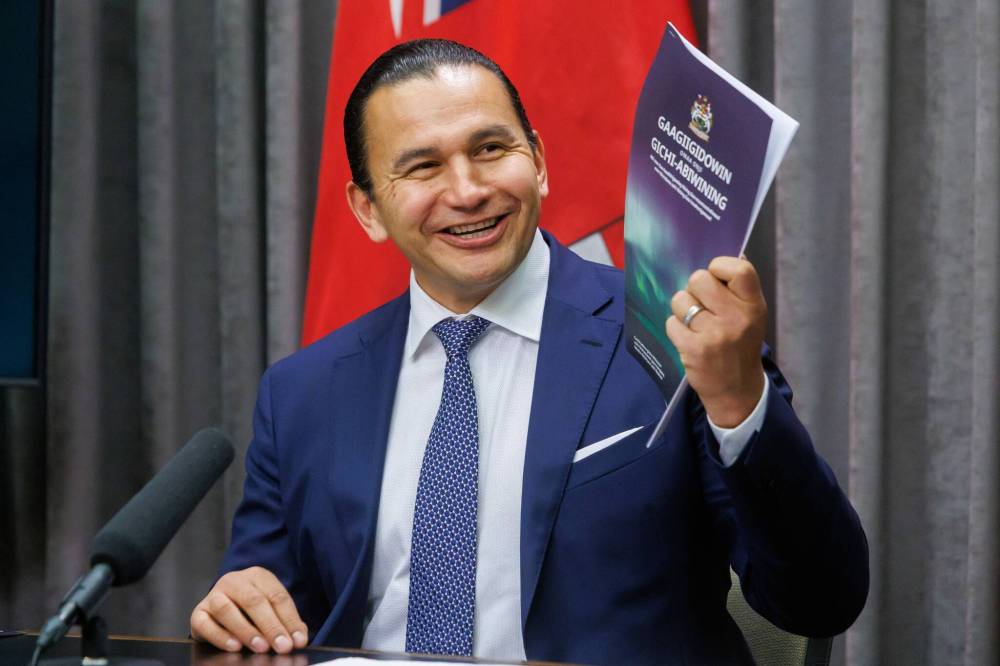Politics
Kinew Government Unveils Health Care Pledges Amid Enforcement Concerns

Manitoba’s Premier, Wab Kinew, announced a series of ambitious health-care commitments during a recent throne speech, including a patient safety charter, legislated staff-to-patient ratios, and a ban on mandatory overtime for nurses. While these pledges may appear promising, questions about their enforcement and practical implications remain at the forefront of discussions regarding the province’s health-care system.
The NDP government has framed the ongoing health-care crisis as largely stemming from staffing shortages and workplace culture issues. Chronic vacancies and high turnover rates have plagued the system for years, leaving many to wonder how these new commitments will translate into actual improvements. Kinew claims progress has been made, citing the recruitment of 285 net new doctors, the addition of nurses, and the reopening of emergency rooms that were previously closed.
Achieving a better work environment and increasing staffing levels are critical steps towards rebuilding the health system. However, these measures alone do not guarantee substantive change. Kinew’s government has promised laws aimed at enhancing patient care, yet the absence of clear enforcement mechanisms raises concerns about their effectiveness.
Questions linger about the implications of the proposed patient safety charter. While the concept of enshrining a patient’s right to quality health care is laudable, it lacks clarity regarding accountability. For instance, what recourse does a patient have if they experience lengthy wait times in an emergency room? Is there a process in place for complaints when a family doctor is unavailable for months due to a shortage in their area?
In response to inquiries about potential consequences for hospitals or regional health authorities that fail to comply with the proposed standards, Kinew stated that further details would emerge with the legislation. This vagueness has prompted skepticism regarding the government’s commitment to enforce these standards effectively.
To ensure that the health-care system functions optimally, Manitoba requires a transparent framework that links legislated obligations with meaningful oversight. The NDP has emphasized the importance of improving staffing and culture as foundational elements of its health-care strategy. Yet, as Kinew himself acknowledged, legislative promises must be accompanied by the necessary resources and accountability mechanisms.
While the government has received commendation for several initiatives outlined in the throne speech—such as expanding pharmacists’ roles, eliminating the need for sick notes, and investing in paramedic training—these proposals do not offset the urgency for clarity on the core commitments that impact patient care directly. For example, the proposed staff-to-patient ratios will only yield improvements if they are backed by adequate funding and if hospitals face genuine consequences for failing to meet these standards.
As Kinew rightly pointed out, patients should not have to rely on the goodwill of hospital administrations to receive timely care. If Manitoba’s new health-care commitments become mere aspirations rather than enforceable laws, the situation will likely remain unchanged for those enduring long waits in emergency rooms or facing delays for essential surgeries.
The government has raised expectations with its health-care initiatives, but it must now demonstrate its ability to deliver real change. Without clear enforcement mechanisms and accountability for the proposed standards, Manitobans may find themselves facing the same health-care challenges they have grappled with for years.
In summary, while the throne speech included several promising ideas, the true test will lie in the government’s ability to translate these commitments into actions that provide tangible improvements for patients across Manitoba.
-

 Politics2 weeks ago
Politics2 weeks agoSecwepemc First Nation Seeks Aboriginal Title Over Kamloops Area
-

 World4 months ago
World4 months agoScientists Unearth Ancient Antarctic Ice to Unlock Climate Secrets
-

 Entertainment4 months ago
Entertainment4 months agoTrump and McCormick to Announce $70 Billion Energy Investments
-

 Lifestyle4 months ago
Lifestyle4 months agoTransLink Launches Food Truck Program to Boost Revenue in Vancouver
-

 Science4 months ago
Science4 months agoFour Astronauts Return to Earth After International Space Station Mission
-

 Technology3 months ago
Technology3 months agoApple Notes Enhances Functionality with Markdown Support in macOS 26
-

 Top Stories1 month ago
Top Stories1 month agoUrgent Update: Fatal Crash on Highway 99 Claims Life of Pitt Meadows Man
-

 Sports4 months ago
Sports4 months agoSearch Underway for Missing Hunter Amid Hokkaido Bear Emergency
-

 Politics3 months ago
Politics3 months agoUkrainian Tennis Star Elina Svitolina Faces Death Threats Online
-

 Politics4 months ago
Politics4 months agoCarney Engages First Nations Leaders at Development Law Summit
-

 Technology4 months ago
Technology4 months agoFrosthaven Launches Early Access on July 31, 2025
-

 Top Stories4 weeks ago
Top Stories4 weeks agoFamily Remembers Beverley Rowbotham 25 Years After Murder





















